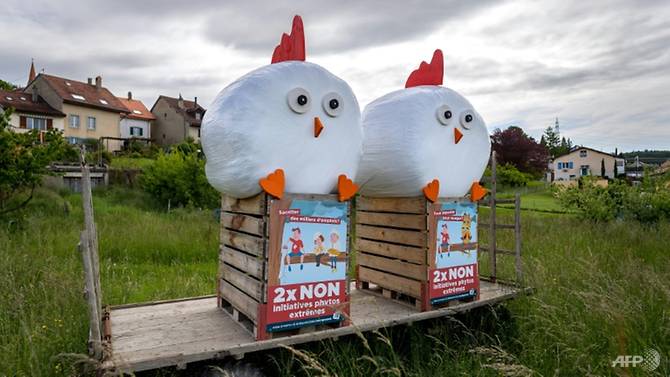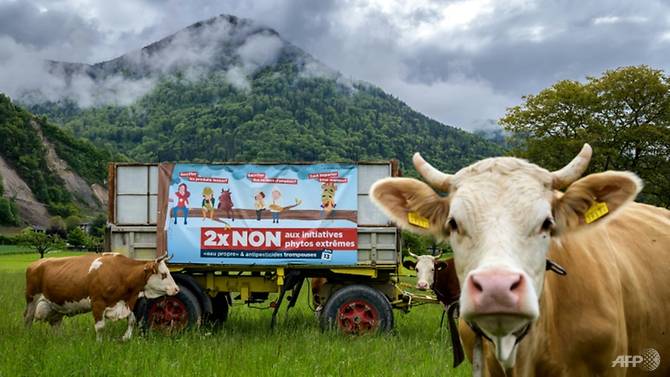June 4, 2025 | 17:40 GMT +7
June 4, 2025 | 17:40 GMT +7
Hotline: 0913.378.918
June 4, 2025 | 17:40 GMT +7
Hotline: 0913.378.918

Farmers in the "Yes" campaign say they have been the victims of insults, threats and intimidation. (Photo: AFP/Fabrice Coffrini)
The Swiss will vote on Jun 13 on a proposal which, if it passes, would make Switzerland the first country in the world to ban synthetic pesticides.
Proponents seek to ban pesticides with non-naturally occurring chemicals - and not only for agriculture but also for public green spaces, private gardens, and even for killing the weeds on railway tracks.
The initiative, entitled "For a Switzerland free from synthetic pesticides", would also ban the import of foodstuffs produced with synthetic pesticides, so as not to put Swiss farmers at a disadvantage.
A campaign marked by heated debates boiled over in the western Vaud region when arsonists torched a trailer in a field displaying banners calling for a "No" vote, infuriating farmers.
Meanwhile farmers in the "Yes" campaign say they have been the victims of insults, threats and intimidation.
SLURRY ON THE BALLOT
Under Switzerland's direct democracy system, referendums and popular votes occur every few months at national, regional and local levels.
Any topic can be put to a national vote as long as it gathers 100,000 signatures in the wealthy nation of 8.6 million people.
Launched by a committee headed up by a winegrower and a soil biology professor from Neuchatel University, the pesticides initiative gathered 121,307 signatures.
A parallel vote on a second initiative is also being held, on an initiative entitled "For clean drinking water and healthy food".
Under the proposal, government subsidies to farms would be limited only to those that do not use pesticides, and to those that do not use antibiotics as a preventative measure, but only to treat sick animals.
To limit the amount of slurry being used on fields - and thereby potentially entering the water system - it would also limit subsidies to only farms that can feed animals with the fodder they produce themselves.
Supporters of the initiative, which garnered 113,979 signatures, say taxpayers' money must not be used to subsidise damage to public health and the environment.
AGRICULTURE GROUPS SPLIT
Large agricultural organisations, including the Swiss Farmers' Union and the Association of Swiss Vegetable Producers, have called for a double "No" vote, deeming the measures too extreme.
"We feed you, we get punished," runs their slogan.
Beekeepers want a double "Yes" vote, while the Bio Suisse group of organic producers and gardeners - in a country where organic farming accounts for 15 per cent of all farms - wants a "Yes" vote on pesticides and a "No" vote on the second initiative.
It says that despite the second initiative's good intentions, the fodder limits would make the work of organic farmers all the harder, without resolving the issue of intensive farming - as large farms could simply renounce subsidies and keep big herds.
The Swiss government recommends a double "No" vote, warning of the risks to food supply that could see prices soar, to the detriment of lower-income households in a country where the cost of living is already high.
"AGRICULTURE MUST CHANGE"

In the one region arsonists torched a trailer in a field displaying banners calling for a "No" vote, infuriating farmers. (Photo: AFP/Fabrice Coffrini)
"Agriculture must change, we agree on that," Francis Egger, deputy director of the Swiss Farmers' Union, told AFP.
"There are two times 100,000 people who have signed, so there is a clear message from consumers," he admitted, adding up the two separate petitions.
But these initiatives go "too far", he said, and risk heavily penalising Swiss farmers who have already made significant efforts to reduce pesticide use.
Antoinette Gilson, a biologist by training and a member of the committee behind the pesticides initiative, insisted: "Our initiative is not directed against farmers."
It aims to ban synthetic pesticides, which are "the most dangerous", and to which farmers themselves are highly exposed, she said, but not organic pesticides or alternatives that do not contain "toxic chemicals".
About 107 active ingredients used for bio-pesticides, including sulphur and copper, would still be authorised, as opposed to 383 today.
The two initiatives started the campaign with clear leads in the polls, but have seen their support levels drop.
A poll published on Jun 2 by the Tamedia press group said the pesticides initiative had 42 per cent support, while the drinking water initiative was running at 41 per cent backing.
Rural voters favour rejecting the proposals while urban voters are overwhelmingly in support of them, the survey showed.
AFP

(VAN) Vikas Rambal has quietly built a $5 billion business empire in manufacturing, property and solar, and catapulted onto the Rich List.

(VAN) Available cropland now at less than five percent, according to latest geospatial assessment from FAO and UNOSAT.

(VAN) Alt Carbon has raised $12 million in a seed round as it plans to scale its carbon dioxide removal work in the South Asian nation.

(VAN) Attempts to bring down the price of the Japanese staple have had little effect amid a cost-of-living crisis.

(VAN) Fourth most important food crop in peril as Latin America and Caribbean suffer from slow-onset climate disaster.

(VAN) Shifting market dynamics and the noise around new legislation has propelled Trouw Nutrition’s research around early life nutrition in poultry. Today, it continues to be a key area of research.

(VAN) India is concerned about its food security and the livelihoods of its farmers if more US food imports are allowed.